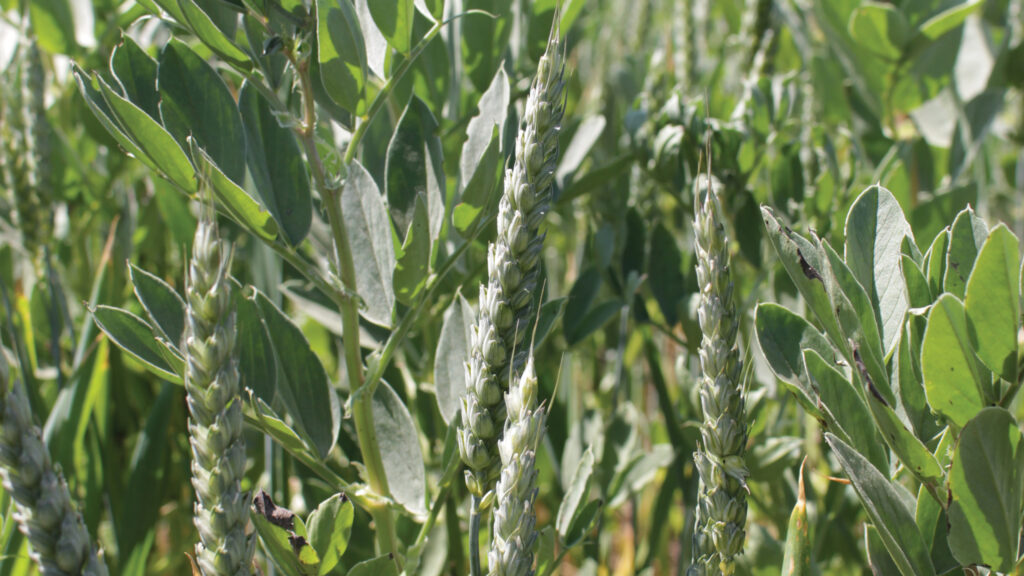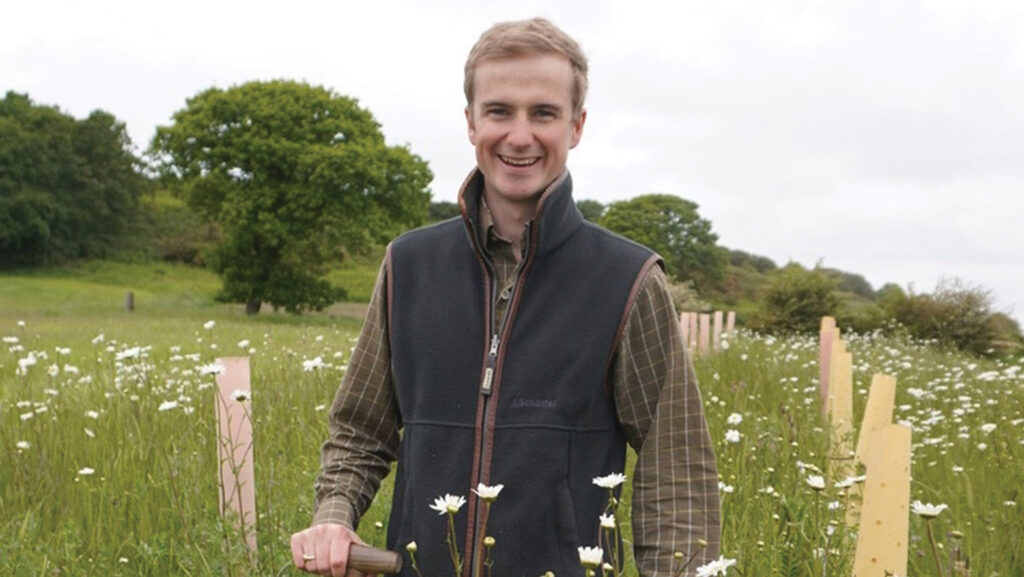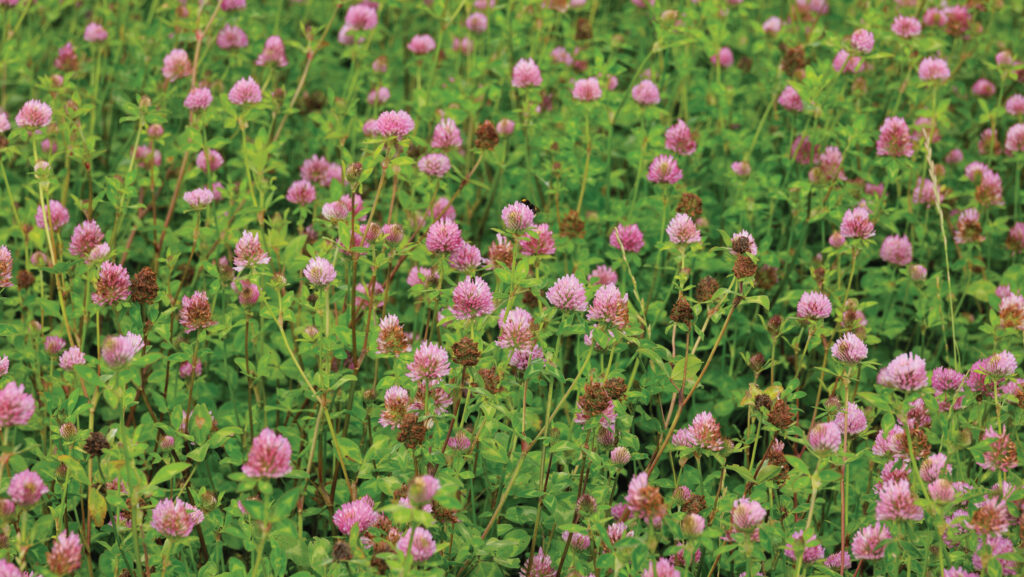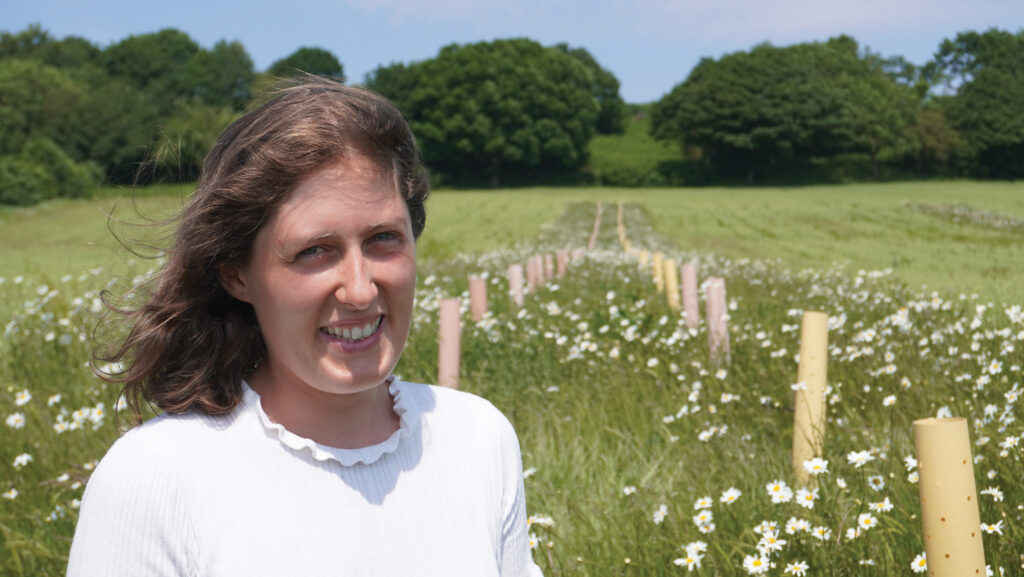How couple are developing an organic, no-till cropping business
 Trials with bi-cropping include wheat and beans © MAG/Richard Allison
Trials with bi-cropping include wheat and beans © MAG/Richard Allison Starting five years ago with an optimistic vision and a blank slate, first-generation organic farmer and emergency doctor Alex Fraser had a plan to produce healthy food for local people.
When the opportunity came up to take on some land around his home in Yorkshire, in partnership with his wife Hannah – also a doctor – the couple set out to convert Denby Hall Farm near Barnsley to organic production.
Alex researched the Stockholm Resilience Centre’s nine planetary boundaries – a set of limits within which humanity can safely operate. He realised that farming could influence five of them by addressing issues such as soil erosion and biodiversity loss, as well as water quality, dietary habits and the food system.
See also: Sussex soil project aims to increase organic matter
“Some of these planetary boundaries are still in place, others have been breached,” he says.
“As crossing them increases the risk of irreversible planetary change, we were looking for a way of growing crops and producing food that wouldn’t contribute to that.”
Starting point
Keen to grow cereals for human consumption, they were fortunate to have a good mentor to help with designing their rotation and getting their farming journey under way.
Starting with a two-year red clover ley for fertility building, in the third year they switched to a wheat blend, followed by spring barley and finally spring oats.
Aiming for organic no-till, they undersowed some crops with white clover, which remained in place after harvest.
Cover crops were integrated ahead of the spring crops, and a flying flock of sheep also became part of the system.

Alex Fraser © Alex Fraser
“As things progressed, we realised there was more we could do,” reports Alex.
“This year, for example, we grew a catch crop after our winter barley. It worked well and the sheep went onto it, but the establishment of the following winter crop was delayed until December.
“It’s still too early to say whether it will be a success.”
Agroforestry scheme
To keep pushing ahead, the couple has also established an agroforestry enterprise.
Double rows of British hardwood trees have been planted in wildflower strips, with 24m of cereal crops grown between them.
The silvo-arable system was funded by the Woodland Trust. It contains a mixture of sycamore, sweet chestnut, hazel and alder trees, which are set to be coppiced.
“We’re on quite an exposed site,” says Alex, “so the trees will provide some shelter as well as giving us various income streams – from SFI and carbon to wood sales and grain income.”
Alex believes that stacking schemes in this way will be important for the financial success of the business.
Variety/crop choices
The milling wheat grown is Millers Choice, a wheat population designed for low-input systems and based on heritage varieties, with in-built resilience from genetic diversity.
“Exploiting that diversity is key for growing a healthy crop without any inputs. We want to produce a quality end product.”

© Tim Scrivener
In the same way, bi-cropping also features on the farm, with oats/vetch and beans/wheat mixes grown.
“The beans/wheat mix, which we grew as a second wheat, did hit 13% protein,” Alex says. “It was quite bean-heavy, so we will continue to tinker with the proportions to see what works best.”
Overcoming hurdles
Alex is honest about the challenges they have faced since starting out.
“One of those is profitability,” he remarks. “We are looking at how we can stack enterprises and schemes, as well as where we can shorten the supply chain.”
They have also had to learn quickly – from how to access funding to understanding the terminology used in farming.
“We just didn’t have the knowledge that comes with growing up on a farm,” he reveals. “Knowing what an NVZ is and what it means for farmland is just one example of that.”
Alex says making decisions in an isolated situation and coping with uncertainty have also been issues, despite being used to the pressures of being an A&E doctor for part of the week.
“You’re on your own much more on a farm. Having a back-up plan is essential.”
Having said that, he recognises the value of the relationships that they have formed since starting the farm business.
“Whether it’s local contractors, our cluster group members, the grain alliance or links with research organisations, we have seen the benefit of building relationships, sharing knowledge and tapping into expertise,” he says.
Researching nutrient-dense foods

Hannah Fraser © Hannah Fraser
On top of her medical and farming responsibilities, Hannah Fraser is undertaking a Nuffield scholarship, looking at the role of farming in producing nutrient-dense foods.
Working as a doctor for the NHS, Hannah is only too aware of the effects diet and lifestyle can have on human health, and she is keen to investigate how different farming practices affect the nutrient density of food.
She is also examining whether there is any evidence to show that nutrient levels in food are declining, as well as trying to define what is meant by nutrient density. If it can be defined, it can be measured.
“What we eat matters,” she says. “Most vitamins and minerals have to come through our diet, as do phytonutrients or antioxidants.”
The latter group doesn’t have a recommended intake, she points out, so people can’t be deficient in them. “But we know they help to reduce inflammation and have anti-cancer properties.”
Almost half of the UK adult population has a long-standing health condition. The average life expectancy is 81 years and the healthy life expectancy 63 years, she reveals. “But both of these figures are in decline.”
Her scholarship travels to date have included a visit to Dan Kittredge at the Bionutrient Food Association (BFA) in Massachusetts, where it was confirmed that variation in nutrient levels existed in common foodstuffs.
“We don’t know if there’s a health impact or if we can farm in a way that promotes nutrition, but we are getting closer to finding out,” she notes.
“There have been differences seen in wheat and oats when crops are grown in healthier soils, and a better ratio of healthy fats in milk from cows on a 100% forage system, for example.”
A handheld scanning device is in development by the BFA, which will allow consumers to scan foodstuffs to see what their nutritional content is and compare them with other foods. “Choosing the one that delivers more nutrition seems sensible,” Hannah says.
Healthier soils are just one potential factor in nutrient density, she says. Genetics and enriched foods could also play a part in improving diets.
“And of course there are also nutrients that we don’t want in our food – toxic heavy metals, pathogens, antibiotics and chemical residues, for example. Again, farming methods can change this.”
Hannah’s Nuffield scholarship is entitled Displacing empty calories with nutrient dense food: how can UK farmers be rewarded for practices that promote nutrient diversity? and is sponsored by the Yorkshire Agricultural Society and the Worshipful Company of Fruiterers.
Alex and Hannah Fraser were speaking at the recent Base-UK conference
